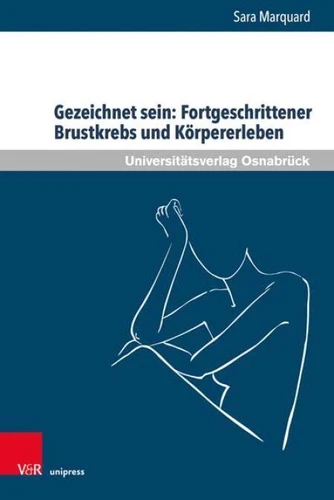Gezeichnet sein: Fortgeschrittener Brustkrebs und Körpererleben. Zur Bedeutung körperlicher Veränderungen und leiblichen Erlebens von Frauen in der letzten Lebensphase
Par :Formats :
Disponible dans votre compte client Decitre ou Furet du Nord dès validation de votre commande. Le format PDF est :
- Compatible avec une lecture sur My Vivlio (smartphone, tablette, ordinateur)
- Compatible avec une lecture sur liseuses Vivlio
- Pour les liseuses autres que Vivlio, vous devez utiliser le logiciel Adobe Digital Edition. Non compatible avec la lecture sur les liseuses Kindle, Remarkable et Sony
 , qui est-ce ?
, qui est-ce ?Notre partenaire de plateforme de lecture numérique où vous retrouverez l'ensemble de vos ebooks gratuitement
Pour en savoir plus sur nos ebooks, consultez notre aide en ligne ici
- Nombre de pages355
- FormatPDF
- ISBN978-3-8470-1425-6
- EAN9783847014256
- Date de parution11/04/2022
- Protection num.pas de protection
- Taille3 Mo
- Infos supplémentairespdf
- ÉditeurV&R Unipress
Résumé
Mit ihrer qualitativen Studie hat Sara Marquard differenziert und empirisch belastbar untersucht, wie Frauen mit einer fortgeschrittenen Brustkrebserkrankung ihre körperlichen Beeinträchtigungen erleben. Das zentrale Phänomen Gezeichnet sein im Handlungs- und Interaktionsmodell zeigt sich bei allen Frauen in einem veränderten Aussehen, spürbaren Veränderungen sowie einem zunehmenden körperlichen Verfall.
Dieser Band fokussiert Probleme und Gestaltungsspielräume des Körpererlebens in der letzten Lebensphase einer Brustkrebserkrankung und widmet sich dabei der Notwendigkeit einer Reflexionskompetenz der onkologisch und palliativ-tätigen Pflegenden sowie einer innovativen und selbstkritischen klinischen Pflegewissenschaft und Forschung im Kontext von Palliative Care. With her qualitative study, Sara Marquard has investigated in a differentiated and empirically robust way how women with advanced breast cancer experience their physical impairments in the last phase of life.
The central phenomenon of being marked in the action and interaction model is evident in all women marked by changes in an altered appearance, noticeable changes as well as an increasing physical decline. This volume focuses on problems and scope for shaping the experience of the body experience in the last phase of life of a cancer illness and is dedicated to the need for reflective competence of nurses working in oncological and palliative care as well as innovative and self-critical clinical nursing science and research in the context of palliative care.
Dieser Band fokussiert Probleme und Gestaltungsspielräume des Körpererlebens in der letzten Lebensphase einer Brustkrebserkrankung und widmet sich dabei der Notwendigkeit einer Reflexionskompetenz der onkologisch und palliativ-tätigen Pflegenden sowie einer innovativen und selbstkritischen klinischen Pflegewissenschaft und Forschung im Kontext von Palliative Care. With her qualitative study, Sara Marquard has investigated in a differentiated and empirically robust way how women with advanced breast cancer experience their physical impairments in the last phase of life.
The central phenomenon of being marked in the action and interaction model is evident in all women marked by changes in an altered appearance, noticeable changes as well as an increasing physical decline. This volume focuses on problems and scope for shaping the experience of the body experience in the last phase of life of a cancer illness and is dedicated to the need for reflective competence of nurses working in oncological and palliative care as well as innovative and self-critical clinical nursing science and research in the context of palliative care.
Mit ihrer qualitativen Studie hat Sara Marquard differenziert und empirisch belastbar untersucht, wie Frauen mit einer fortgeschrittenen Brustkrebserkrankung ihre körperlichen Beeinträchtigungen erleben. Das zentrale Phänomen Gezeichnet sein im Handlungs- und Interaktionsmodell zeigt sich bei allen Frauen in einem veränderten Aussehen, spürbaren Veränderungen sowie einem zunehmenden körperlichen Verfall.
Dieser Band fokussiert Probleme und Gestaltungsspielräume des Körpererlebens in der letzten Lebensphase einer Brustkrebserkrankung und widmet sich dabei der Notwendigkeit einer Reflexionskompetenz der onkologisch und palliativ-tätigen Pflegenden sowie einer innovativen und selbstkritischen klinischen Pflegewissenschaft und Forschung im Kontext von Palliative Care. With her qualitative study, Sara Marquard has investigated in a differentiated and empirically robust way how women with advanced breast cancer experience their physical impairments in the last phase of life.
The central phenomenon of being marked in the action and interaction model is evident in all women marked by changes in an altered appearance, noticeable changes as well as an increasing physical decline. This volume focuses on problems and scope for shaping the experience of the body experience in the last phase of life of a cancer illness and is dedicated to the need for reflective competence of nurses working in oncological and palliative care as well as innovative and self-critical clinical nursing science and research in the context of palliative care.
Dieser Band fokussiert Probleme und Gestaltungsspielräume des Körpererlebens in der letzten Lebensphase einer Brustkrebserkrankung und widmet sich dabei der Notwendigkeit einer Reflexionskompetenz der onkologisch und palliativ-tätigen Pflegenden sowie einer innovativen und selbstkritischen klinischen Pflegewissenschaft und Forschung im Kontext von Palliative Care. With her qualitative study, Sara Marquard has investigated in a differentiated and empirically robust way how women with advanced breast cancer experience their physical impairments in the last phase of life.
The central phenomenon of being marked in the action and interaction model is evident in all women marked by changes in an altered appearance, noticeable changes as well as an increasing physical decline. This volume focuses on problems and scope for shaping the experience of the body experience in the last phase of life of a cancer illness and is dedicated to the need for reflective competence of nurses working in oncological and palliative care as well as innovative and self-critical clinical nursing science and research in the context of palliative care.




